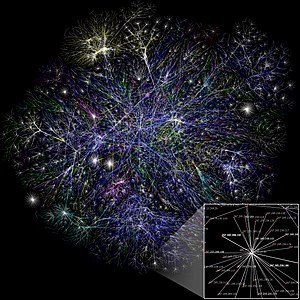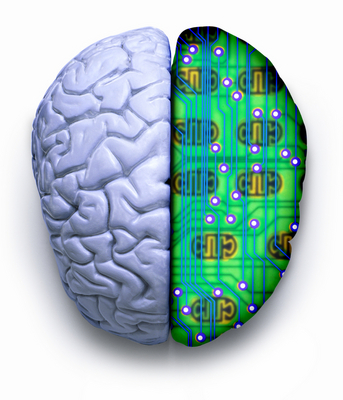 Image via Wikipedia
Image via Wikipedia

At the edge of thought
Amanda Gefter
I know that the New Year has officially arrived when John Brockman publishes the responses to his Annual Question over at the Edge website.
This year, Brockman asked his crew of intellectual heavy-hitters, "How is the internet changing the way you think?"
The answers range from "It's not" to "Everything's going to hell" to "The internet is making us smarter, more social and more evolved" to "Who the hell knows?", with a dose of everything in between.
As I read through the responses, I found myself convinced more than once by conflicting arguments--a classic internet experience, I think. And despite the loudly bemoaned internet-induced ADD epidemic, one can easily spend hours reading through these intriguing responses.
Brockman himself sets the tone with the idea that the internet has formed a sort of collective consciousness and with the conviction that "new technologies beget new perceptions. Reality is a man-made process. Our images of our world and ourselves are, in part, models resulting form our perceptions of the technologies we generate."

Is the internet a cognitive prosthesis, or merely a mirror of old-fashioned human nature? Have we outsourced our memories and faculties of judgment to the virtual universe and the hive mind? What have we sacrificed? What have we gained?
For computer scientist Daniel Hillis, the internet has changed the way we make decisions, as we farm individual choices out to the collective web. "If the theme of the Enlightenment was independence," he writes, "our own theme is interdependence. We are now all connected, humans and machines. Welcome to the Entanglement."
But for those who are overly concerned that such entanglement has usurped individual thought, Larry Sanger, co-founder of Wikipedia, has some advice: "If you feel yourself growing ovine, bleat for yourself."
Nassim Taleb, who has placed himself on a strict internet diet, is worried that "more information causes more confidence and illusions of knowledge while degrading predictability."
For royal astronomer Martin Rees, "the internet enables far wider participation in front-line science", though Philip Campbell, editor-in-chief of Nature, believes this might have happened more readily had Congress not rejected funding for a digitized indexing search infrastructure called PubSCIENCE.
Writer Howard Rheingold reminds us that "attention is the fundamental literacy", advocating mindfulness of how our attention wanders about the internet as we surf. It makes you wonder whether kids growing up in the internet age ought to be taught in school, as a matter of standard practice, Rheingold's basic elements of internet literacy: attention mindfulness, crap detection, participation, collaboration and network awareness.

I think Paul Saffo, a technology forecaster at Stanford University, might agree. Saffo paraphrases Samuel Johnson, who said that there are two kinds of knowledge: that which you know and that which you know where to get. Now, Saffo says, we don't have to know where to get information--the internet does that for us. But perhaps there is now a third kind of knowledge: the knowledge of what matters.
I was intrigued by the comparisons between the internet and multicellularity in biological organisms discussed by evolutionary biologist Richard Dawkins and cognitive biologist W. Tecumseh Fitch.
But my favorite responses were geneticist George Church's cleverly hyperlinked piece, "Sorry, John, no time to think about the Edge question", architect Neri Oxman's comparisons to Borges and her suggestion that in the light of the internet "models become the very reality that we are asked to model", and David Eagleman's "Six ways the internet may save civilization".
Another favorite of mine was the piece by neuro-philosopher Thomas Metzinger, who serves up this fascinating food for thought:
Here is something we are just beginning to understand -- that the Internet affects our sense of selfhood, and on a deep functional level.
Consciousness is the space of attentional agency: Conscious information is exactly that information in your brain to which you can deliberately direct your attention. As an attentional agent, you can initiate a shift in attention and, as it were, direct your inner flashlight at certain targets: a perceptual object, say, or a specific feeling. In many situations, people lose the property of attentional agency, and consequently their sense of self is weakened. Infants cannot control their visual attention; their gaze seems to wander aimlessly from one object to another, because this part of their Ego is not yet consolidated. Another example of consciousness without attentional control is the non-lucid dream state. In other cases, too, such as severe drunkenness or senile dementia, you may lose the ability to direct your attention -- and, correspondingly, feel that your "self" is falling apart.
If it is true that the experience of controlling and sustaining your focus of attention is one of the deeper layers of phenomenal selfhood, then what we are currently witnessing is not only an organized attack on the space of consciousness per se but a mild form of depersonalization. New medial environments may therefore create a new form of waking consciousness that resembles weakly subjective states -- a mixture of dreaming, dementia, intoxication, and infantilization. Now we all do this together, every day. I call it Public Dreaming.
So go celebrate the New Year with the brains at the Edge and remember, without the internet, you wouldn't have this awesome concentration of intellectual power. Then again, as software pioneer Kai Krause points out, these answers will soon end up in the form of a good old-fashioned book.
![Reblog this post [with Zemanta]](http://img.zemanta.com/reblog_e.png?x-id=04f60a4c-9987-451e-8370-a947fc015bea)
No comments:
Post a Comment